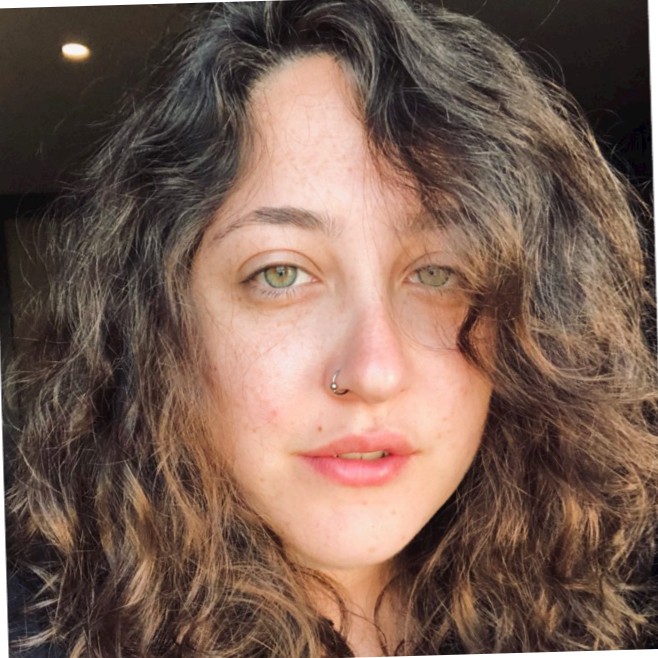Welcome back to our “6 questions” series where we ask someone 6 career-centric questions about themselves.
This week we’re chatting with Juli Teitler, freelance photographer + photographer/retoucher at Master & Dynamic. A “one-woman show,” Teitler gives us a glimpse into the world of freelance photography in New York City.
What does a day in your life look like?
Since I’ve started my part-time job, working three times a week at Master & Dynamic as a photographer and retoucher, my life has settled into a nice routine I’ve been longing for. When working freelance, it’s hard to determine when the next job or assignment will come, so it’s crucial for me to have that extra income while holding on to my little rituals that advance my career.
I dedicate my off days to photoshoots, rest (which took some time not to feel guilty about!) or to whichever task is ahead of me, from retouching to location scouting. Once I’m done feeding the cat and drinking coffee, I go over my emails. This would usually include any correspondence about future photoshoots or retouching gigs.
Then I’ll go over Linkedin, Glassdoor, Working Not Working and Indeed to see if there’re any exciting opportunities I shouldn’t miss out on and apply to what fits.
What would most people not expect about your job?
I’m a one-woman show. I produce, shoot, and retouch most of my projects.
80% of the job is logistics and includes emailing, location scouting, networking, retouching, and only 20% is the practical stuff, going on photoshoots and being a (sparkles emoji) photographer. You need patience in this profession and finding ways to keep busy.
When did you know you wanted to be a full-time photographer? That is wasn’t just “a hobby.”
I’m going to be super corny and say that this job sort of chose me and not me it.
I’ve been doing this since I was 16 (don’t ever start an artist statement with that by the way, everyone did) and have invested most of my time planning photoshoots or pushing my work into media platforms. Once I finished my military service in Israel, it only made sense to start studying, and it was my mom who suggested I look into the Fashion Institute of Technology in NYC (thanks Mom!). Once I moved, it became clear that this is it, it isn’t a hobby anymore – but the start of a career.
If someone wants to further develop their photography skills, what could they do?
Keep shooting! Do the work you want to make and learn that it’s okay not always to get the desired results, you learn from your mistakes (I definitely still do). If it’s technical skills, I always recommend looking into what courses universities or museums might offer or check out ICP, Broncolor or Adorama if you’re in NYC.
Going freelance is scary, let’s say someone wants to be a freelance photographer but is scared to take the leap, what advice do you have for them?
When I graduated, I felt pretty lost. I was unemployed and kept applying for jobs I didn’t get while also trying my best to advance my freelance career. I spoke to my cousin, who was in a similar position (working in film), and he gave me an essential piece of advice. Do one thing each day that promotes your career – be it applying for jobs, updating your website, changing your resume format, finding new contacts. Once I started doing that I stopped feeling sorry for myself, and by the end of the day, I felt encouraged that I chose to work, even for one hour instead of staring at the TV. Eventually, it all came together, and work started coming in.
It’s important to understand that you don’t need to have it all, all at once.
All of my peers, myself included, have a part or full-time day job that helps support our freelance career. Photography costs money (living costs money) and a stable job can really help funding your passion projects, catering for a team (important stuff, don’t let your crew go hungry) and paying the bills. It’s also important for a feeling of self-worth (artists are fragile; we all know we need that!).
How do find new work and new projects?
Cold emailing is something that I’ve been doing for the past few months.
Each day I either compile lists of contacts or places I’d like to work for or edit my portfolio for the brand I’m reaching out. I make sure to write personalized emails stating I’d love to work with them, why I’d be a good fit and what I love about their brand. Most of the time I don’t get a reply (and learned not to take it personally), but when I do, it’s incredibly satisfying, and I’ve gained another contact for my network.
In photography, new work and new projects are the ones you make. You don’t need the excuse of a client or an assignment to keep creating, because, in truth, work comes from work. I go to museums or read for inspiration, I take my personal stories and weave them into conceptual pieces. This is the work that matters, the work that genuinely excites me. Create something dear to you and pitch it to magazines and the people around you. Clients will want to hire you for your own stylistic language and artistic voice, and when they do, you’ll find that these positions are the most gratifying, because there’s nothing better than getting paid to do what you love most.

Juli Teitler is an Israeli artist based in NYC. She received her BFA in Photography with honors with a minor in History of Art from the Fashion Institute of Technology in 2017. In her work, Teitler focuses on narratives dealing with womanhood, relationships, identity and sexuality.